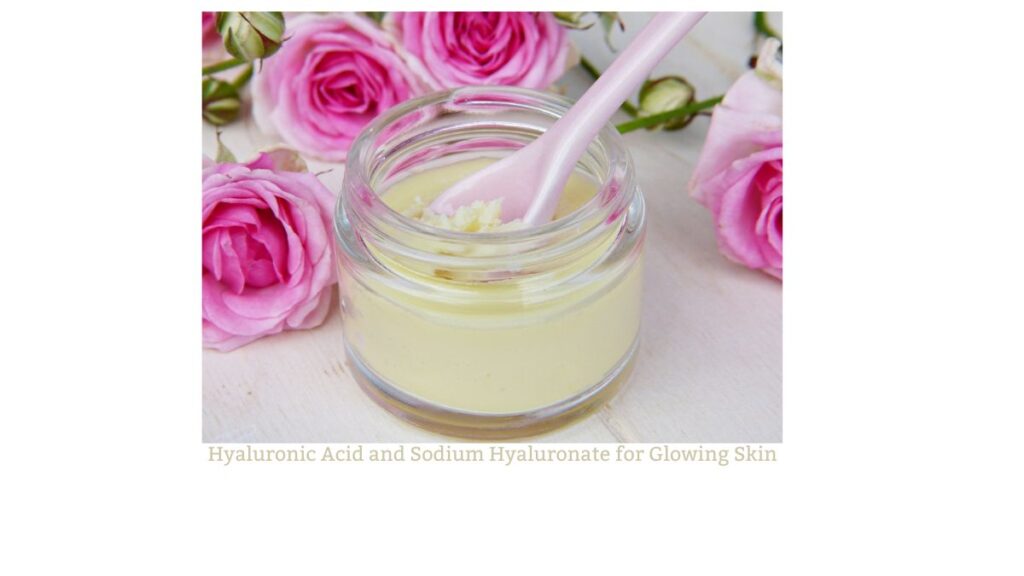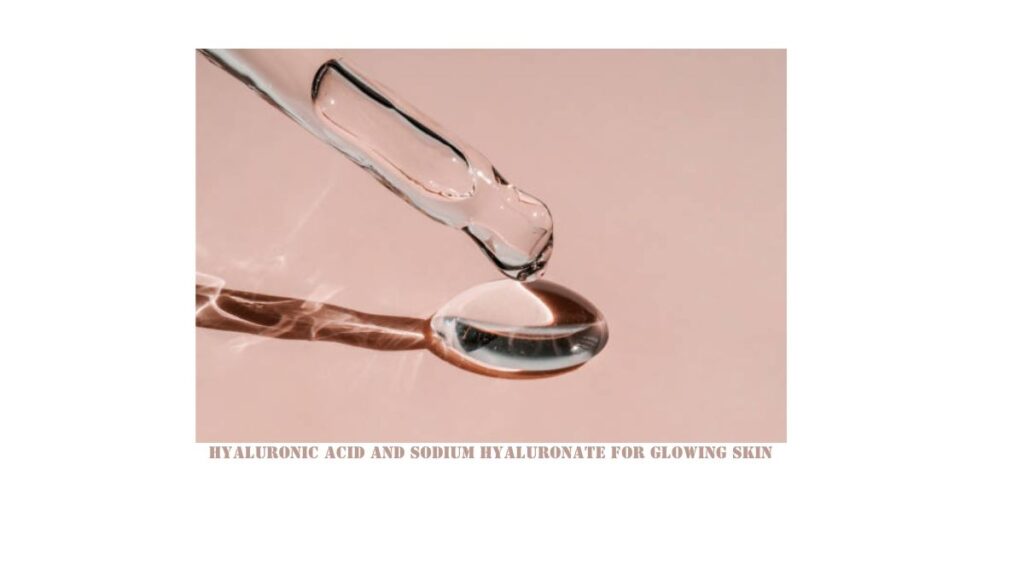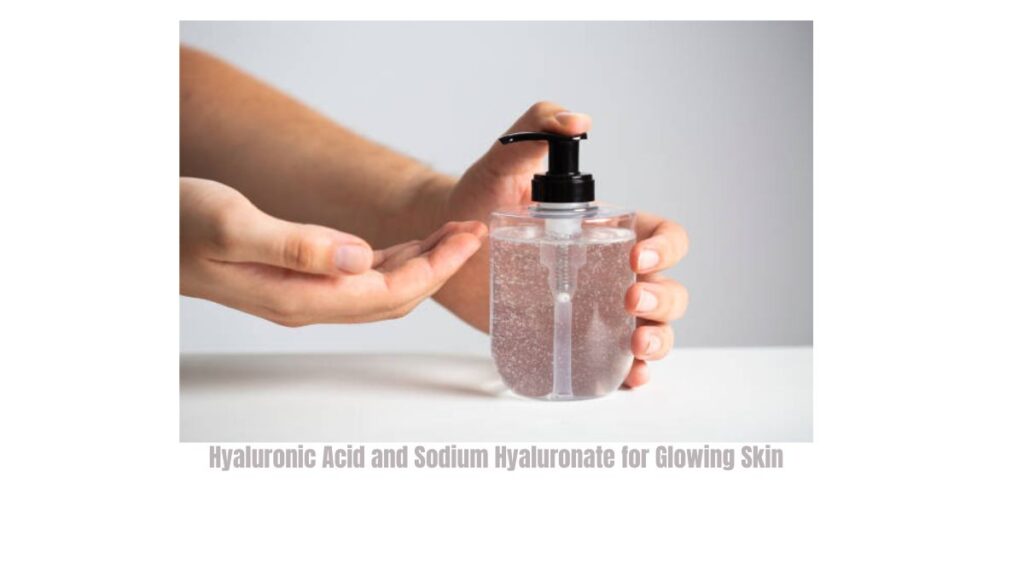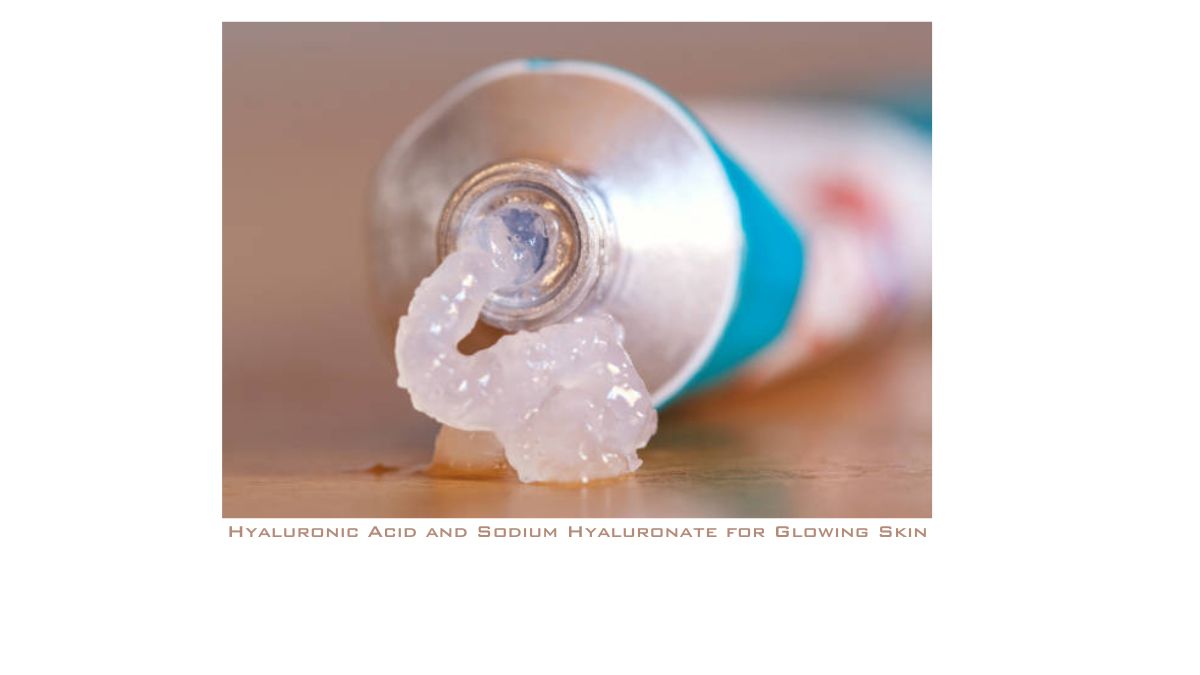Introduction:-
Unveiling the Truth: Hyaluronic Acid and Sodium Hyaluronate for Glowing Skin
In the realm of skincare, the quest for radiant and healthy skin leads many to explore the benefits of various ingredients. Among these, hyaluronic acid and sodium hyaluronate stand out for their acclaimed hydrating properties. But which one truly reigns supreme for skin health? Let’s embark on a comparative analysis to uncover the answer.
Understanding Hyaluronic Acid and Sodium Hyaluronate:
Before delving into the comparison, it’s essential to grasp the basics. Hyaluronic acid and sodium hyaluronate are both naturally occurring substances in the body, renowned for their ability to attract and retain moisture, thereby promoting skin hydration. However, they differ in molecular size and formulation, which can impact their effectiveness in skincare products.

The Role of Hyaluronic Acid: Hyaluronic acid, often touted as the “fountain of youth” ingredient, boasts a larger molecular size. Its ability to hold up to 1000 times its weight in water makes it a powerhouse for hydration. When applied topically, hyaluronic acid penetrates the skin’s surface, binding moisture to plump and rejuvenate the complexion. Its lightweight texture makes it suitable for all skin types, including sensitive and acne-prone skin.
The Promise of Sodium Hyaluronate: On the other hand, sodium hyaluronate, the salt form of hyaluronic acid, possesses a smaller molecular size. This allows it to penetrate deeper into the skin, delivering intense hydration at a cellular level. Sodium hyaluronate’s smaller molecules enable better absorption, making it an excellent choice for targeting fine lines, wrinkles, and overall skin rejuvenation.
Comparative Analysis: When comparing hyaluronic acid and sodium hyaluronate for skin health, several factors come into play. Hyaluronic acid’s larger molecules provide surface hydration, creating a dewy and supple complexion. Meanwhile, sodium hyaluronate’s smaller molecules penetrate deeper, offering long-lasting moisture retention and plumping effects.
Furthermore, while hyaluronic acid is prized for its humectant properties, sodium hyaluronate’s superior absorption makes it ideal for addressing specific skincare concerns like signs of aging and dehydration.
Choosing the Right Ingredient for Your Skincare Routine: Ultimately, the choice between hyaluronic acid and sodium hyaluronate depends on your skin type, concerns, and preferences. For those seeking lightweight hydration and a youthful glow, hyaluronic acid-infused products may suffice. Conversely, individuals targeting deeper hydration and anti-aging benefits may opt for sodium hyaluronate formulations.
What are the side effects of using hyaluronic acid and sodium hyaluronate in excessive amounts for skin care?
Hyaluronic acid and sodium hyaluronate are generally considered safe for use in skincare products and are well-tolerated by most individuals. However, excessive use or misuse of these ingredients can potentially lead to side effects. Here are some potential side effects associated with using hyaluronic acid and sodium hyaluronate in excessive amounts:

- Skin Irritation: Applying hyaluronic acid or sodium hyaluronate in high concentrations or too frequently may cause skin irritation, redness, itching, or a burning sensation. This is more likely to occur in individuals with sensitive skin.
- Dryness: Ironically, excessive use of hyaluronic acid can sometimes result in temporary dryness. This can happen if the surrounding environment is very dry, as hyaluronic acid may draw moisture from the deeper layers of the skin to the surface, leading to transient dehydration.
- Breakouts: While hyaluronic acid is generally non-comedogenic (meaning it doesn’t clog pores), using it excessively or in very thick formulations could potentially contribute to breakouts in some individuals, especially those prone to acne.
- Increased Sensitivity to Sun: Some studies suggest that hyaluronic acid, when used in excessive amounts, may make the skin more susceptible to damage from UV rays. This underscores the importance of using sunscreen regularly, especially when incorporating hyaluronic acid or sodium hyaluronate into your skincare routine.
- Allergic Reactions: Although rare, some individuals may be allergic to hyaluronic acid or sodium hyaluronate. Allergic reactions can manifest as hives, swelling, or even anaphylaxis in severe cases. It’s essential to discontinue use immediately if any signs of an allergic reaction occur and seek medical attention.
To minimize the risk of side effects, it’s crucial to follow the recommended usage guidelines provided by the product manufacturer and to patch-test new products before applying them to larger areas of the skin. Additionally, incorporating hyaluronic acid or sodium hyaluronate into a balanced skincare regimen that includes other hydrating and moisturizing ingredients can help optimize their benefits while reducing the likelihood of adverse effects. If you have any concerns about using hyaluronic acid or sodium hyaluronate, consulting with a dermatologist or skincare professional is advisable.
Which skin care products made from hyaluronic acid and sodium hyaluronate are available in the market?
There is a wide range of skincare products available in the market that incorporate hyaluronic acid and sodium hyaluronate as key ingredients. These products come in various forms, including serums, moisturizers, masks, cleansers, and more. Here are some popular skincare products containing hyaluronic acid and sodium hyaluronate:

- Hyaluronic Acid Serums: These lightweight serums are formulated to deliver concentrated hydration to the skin, helping to plump and smooth the complexion. Examples include:
- The Ordinary Hyaluronic Acid 2% + B5
- Neutrogena Hydro Boost Hyaluronic Acid Serum
- Drunk Elephant B-Hydra Intensive Hydration Serum
- Moisturizers: Hyaluronic acid and sodium hyaluronate are common ingredients in moisturizers, helping to lock in moisture and keep the skin hydrated throughout the day. Some popular options include:
- CeraVe Hydrating Facial Moisturizing Lotion
- La Roche-Posay Hyalu B5 Hyaluronic Acid Cream
- Mario Badescu Hyaluronic Dew Cream
- Sheet Masks: Sheet masks infused with hyaluronic acid and sodium hyaluronate provide an intense burst of hydration and can be used as part of a weekly skincare routine. Examples include:
- TONYMOLY Master Lab Hyaluronic Acid Mask
- Garnier SkinActive Moisture Bomb Sheet Mask
- Leaders Insolution Hydrating Sheet Mask
- Cleansers: Some cleansers contain hyaluronic acid or sodium hyaluronate to help hydrate the skin while cleansing. These products are gentle and suitable for daily use. Examples include:
- Hada Labo Tokyo Hydrating Facial Cleanser
- First Aid Beauty Pure Skin Face Cleanser
- Glossier Milky Jelly Cleanser
- Eye Creams: Hyaluronic acid and sodium hyaluronate can also be found in eye creams, which help to hydrate and plump the delicate skin around the eyes. Examples include:
- Kiehl’s Creamy Eye Treatment with Avocado
- Peter Thomas Roth Water Drench Hyaluronic Cloud Hydra-Gel Eye Patches
- The INKEY List Caffeine Eye Cream
These are just a few examples of the many skincare products available on the market that contain hyaluronic acid and sodium hyaluronate. When choosing a product, it’s essential to consider your skin type, concerns, and preferences, as well as to read reviews and ingredient lists to ensure the product is suitable for you.
Conclusion:
In the realm of skincare, the battle between hyaluronic acid and sodium hyaluronate continues to spark debate. While both ingredients offer valuable benefits for skin health, their distinct properties cater to different needs and preferences. Whether you prioritize surface hydration or cellular rejuvenation, incorporating either hyaluronic acid or sodium hyaluronate into your skincare routine can help you achieve the radiant complexion you desire.






